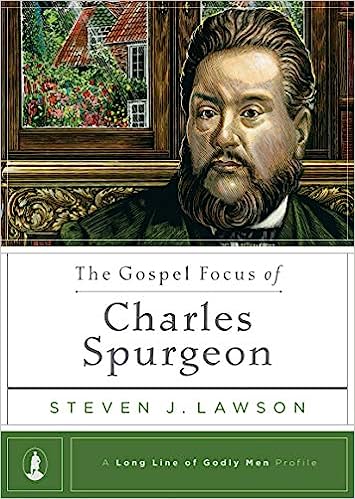
Steven Lawson has spent the best part of forty years studying the life and ministry of the great Baptist preacher Charles Spurgeon, and it shows in this latest addition to his excellent series ‘A Long Line of Godly Men’. This is a truly masterful summary of the ministry of ‘…arguably the preeminent preacher of any century’ and the theological convictions that underpinned that ministry, giving it both depth and passion. Lawson quotes extensively from the Prince of Preachers demonstrating a remarkable breadth of knowledge of Spurgeon’s work.
After an opening chapter in which he gives a biographical overview of his subject’s life, Lawson explores Spurgeon’s commitment to the inspiration, inerrancy and authority of the Scriptures alongside a voracious appetite for reading, drawing on the 12,000 volumes in his own library, of which ‘he read the vast majority….and he never preached without diligently consulting them.’
Spurgeon’s theological convictions were unashamedly Calvinistic. ‘It is no novelty, then, that I am preaching no new doctrine. I love to proclaim these strong old doctrines, that are called by nickname Calvinism, but which are surely and verily the revealed truth of God as it is in Christ Jesus.’ Lawson takes each of the traditional five points of Calvinism and, using quotes from Spurgeon’s own ministry, shows how they were the ‘high-octane fuel that powered his fiery preaching of the gospel.’
In what was for me the most revealing and instructive chapter, Lawson examines Spurgeon’s evangelistic fervour. Far from being a hindrance to passionate evangelism as they are so often erroneously portrayed, it was these very truths that made Spurgeon ‘…the most visible evangelistic preacher of any generation.’ Lawson points to his bold proclamations, open invitations, tender appeals, sound reasonings, compelling persuasions, authoritative commands and severe warnings and shows how this remarkable variety of forthrightness, tender heartedness and prophetic authority were so mightily used by God. Lawson writes, ‘Spurgeon was incapable of making a stoic presentation of the gospel, a cold statement of truths. He was deeply aware that he was not lecturing to students but preaching to sinners. There is a place for both forms of communication, but not in the pulpit. The gospel, Spurgeon believed, must be voiced with red-hot persuasions.’
No-one who ever heard Spurgeon preach or has read one of his sermons would have been in any doubt that the gospel he loved and preached was a Christ-centred one. Lawson, again using quotations from his ministry, reveals Spurgeon’s convictions regarding the person, death, resurrection and exaltation of the Saviour. ‘For Spurgeon, preaching the gospel meant preaching the person and work of Christ. As he said, “The more gospel we would preach, the more of Christ we must proclaim.””
Though he undoubtedly possessed a great intellect and powers of orator, the power in every aspect of Spurgeon’s ministry was the working of the Holy Spirit. ‘Spurgeon never forgot that as he studied, he was entirely dependent on the Spirit to lead him into the truth.’
Perhaps, like me, you have read numerous works about Spurgeon, and you doubt whether there’s much new to learn. I am certain that this book will not only inform your mind but also inflame your heart. You would have to have a particularly hard one not to be stirred by this account. It is an inspirational record of a singularly used servant of the Word, but as well as encouraging preachers to recommit to the same convictions as Spurgeon, it also ought to drive us to our knees to plead with God to raise up another like him, for we are desperately in need of such preaching today.
Reformation Trust Review written in 2012